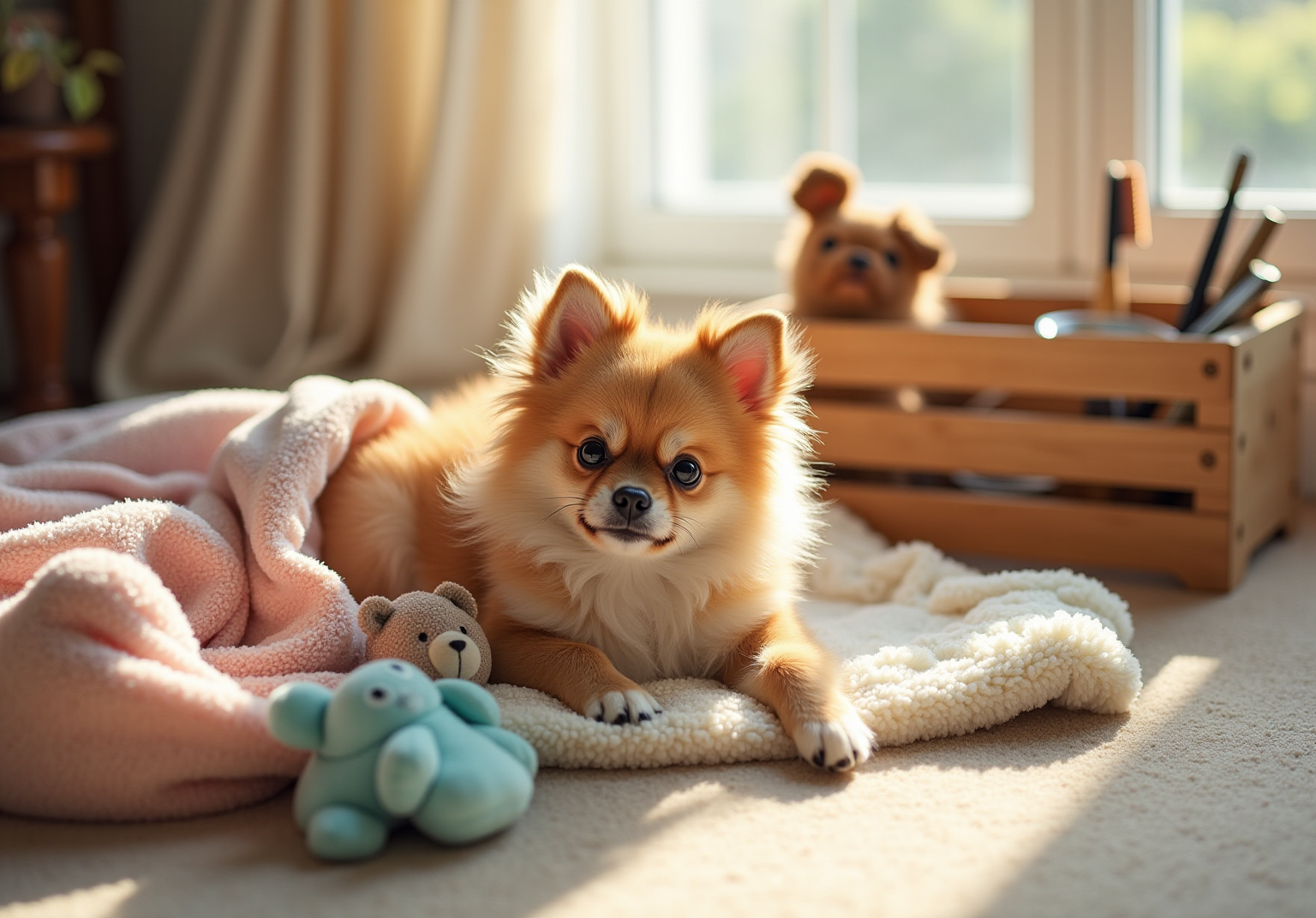
Essential Care Tips for Your Toy Dog’s Health and Happiness
Overview
Caring for your toy dog’s health and happiness starts with understanding their unique needs. It’s important to recognize that these little companions require tailored nutrition, regular exercise, and socialization to thrive. By providing a warm environment, specialized diets, and ensuring they have opportunities for social interactions, you can significantly enhance their overall well-being. Additionally, prioritizing dental care is crucial to keeping them happy and healthy.
As a devoted pet owner, you may often worry about whether you’re doing enough for your furry friend. This concern is completely normal, and it shows how much you care. Addressing these essential areas of care not only supports your toy dog’s physical health but also nurtures their emotional happiness. Remember, you are not alone in this journey; many pet owners share similar feelings and experiences.
Implementing a consistent grooming and health care routine is another important aspect of your toy dog’s care. Regular grooming not only keeps their coat looking lovely but also offers an opportunity for bonding. By taking these steps, you are ensuring that your beloved companion enjoys a fulfilling and joyful life. With the right approach and support, you can create a nurturing environment that fosters both health and happiness for your toy dog.
Introduction
Toy dogs, with their charming personalities and petite sizes, bring immense joy to many households. However, they come with a unique set of care requirements that can often be easily overlooked. Understanding the specific health, nutrition, and socialization needs of these small breeds is essential for ensuring their well-being and happiness.
As loving pet parents, how can we navigate the complexities of caring for our toy companions while fostering a loving and secure environment? This article delves into essential care tips that will empower you to provide the best for your beloved toy dogs, ensuring they thrive in every aspect of life.
Understand the Unique Needs of Toy Dogs
Toy dogs like Chihuahuas, Pomeranians, and Toy Poodles bring immense joy due to their small size and vibrant personalities. However, their unique needs require attentive care due to their heightened sensitivity to temperature changes. They thrive in warm, stable environments that protect their delicate bones and joints, which makes them more susceptible to injuries. It’s essential to handle them with care, as understanding their behavioral traits—like anxiety and attachment issues—plays a vital role in nurturing a loving relationship.
Creating a secure space free from hazards and maintaining a consistent routine can significantly enhance their sense of safety. Regular veterinary check-ups are crucial for monitoring their health, especially concerning common issues in small breeds, such as dental problems and patellar luxation. Additionally, veterinarians highlight the importance of socialization and training to alleviate anxiety, ensuring that these affectionate companions flourish in their surroundings.
At Jet Pet Resort, we understand the unique needs of toy dogs, which is why we offer a specialized Tiny Tots activity schedule. This program provides daily outdoor playtime tailored specifically for little breeds. Our organized routine features interactive activities, including:
- Monitored play sessions
- Agility workouts
- Opportunities for socialization with other small canines
These enriching experiences not only promote physical well-being but also foster social skills, helping to reduce anxiety levels in toy dogs and ensuring they feel secure and content in a loving, safe environment.
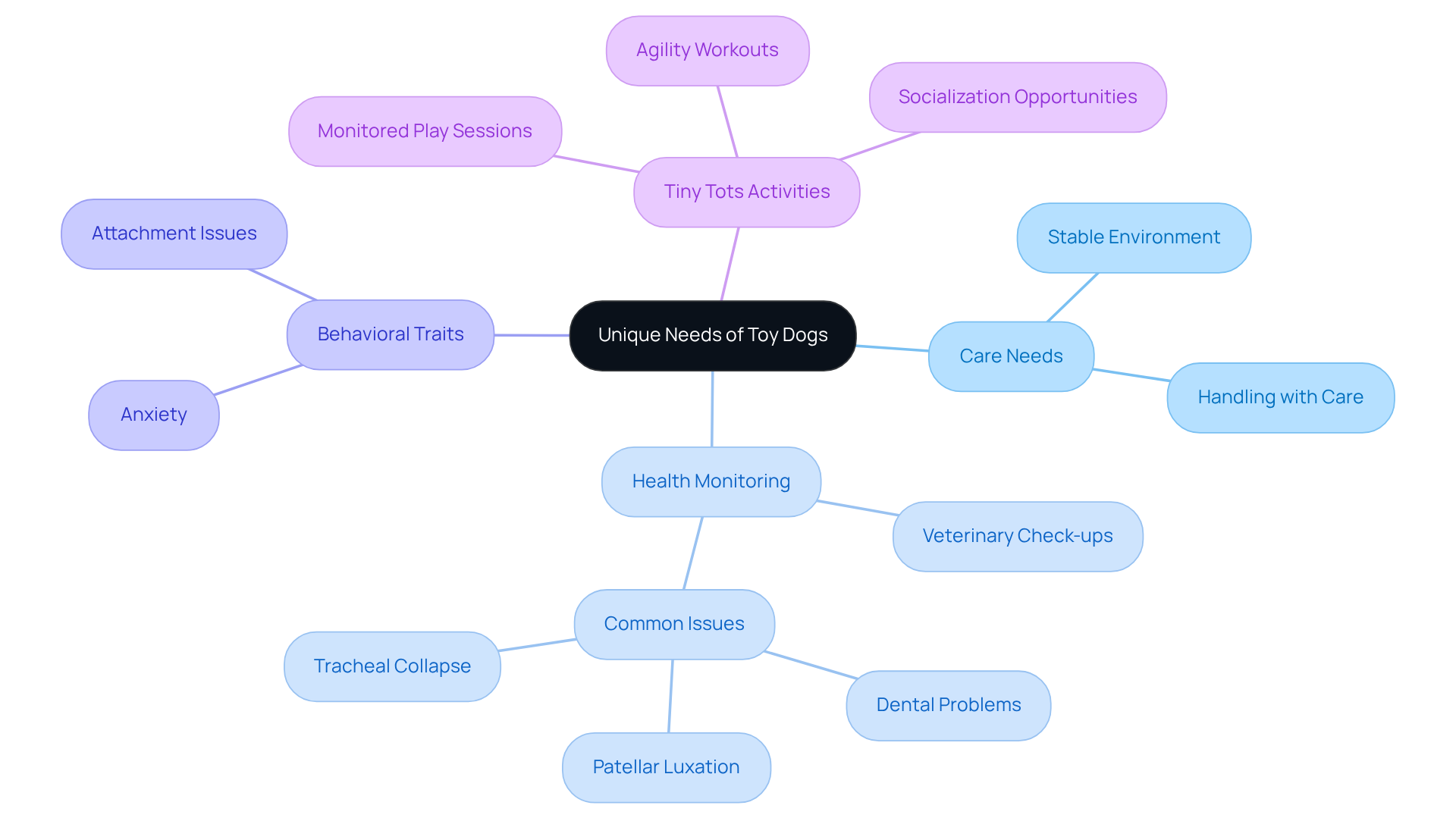
Provide Tailored Nutrition for Optimal Health
Caring for toy dogs requires understanding their unique dietary needs, necessitating a diet rich in high-quality proteins and essential nutrients to support their energy levels and overall health. Given their limited stomach capacity, these little companions benefit from lighter, more frequent meals throughout the day. As a loving owner, it’s crucial to select dog food specifically formulated for small breeds, which typically features higher calorie density and tailored nutrient profiles. Monitoring their weight closely is also important, as toy breeds can be prone to obesity, which can be concerning for any devoted pet parent.
Incorporating fresh fruits and vegetables as snacks can provide extra vitamins and minerals, but it’s essential to avoid harmful items like grapes and chocolate, which can pose serious risks to their health. Regular consultations with a veterinarian can help ensure that your beloved pet’s dietary plan remains optimal as they age, allowing you to address any concerns proactively.
At Jet Pet Resort, we understand the importance of providing a secure and cozy environment for your toy dog. Our designated play area is thoughtfully designed to protect their tiny paws while they enjoy fun and enrichment activities. Our dedicated team is committed to ensuring that each little dog receives the specialized care they need, making their stay both enjoyable and stress-free. We invite you to be part of our caring community, where your furry family members receive the love and attention they deserve.
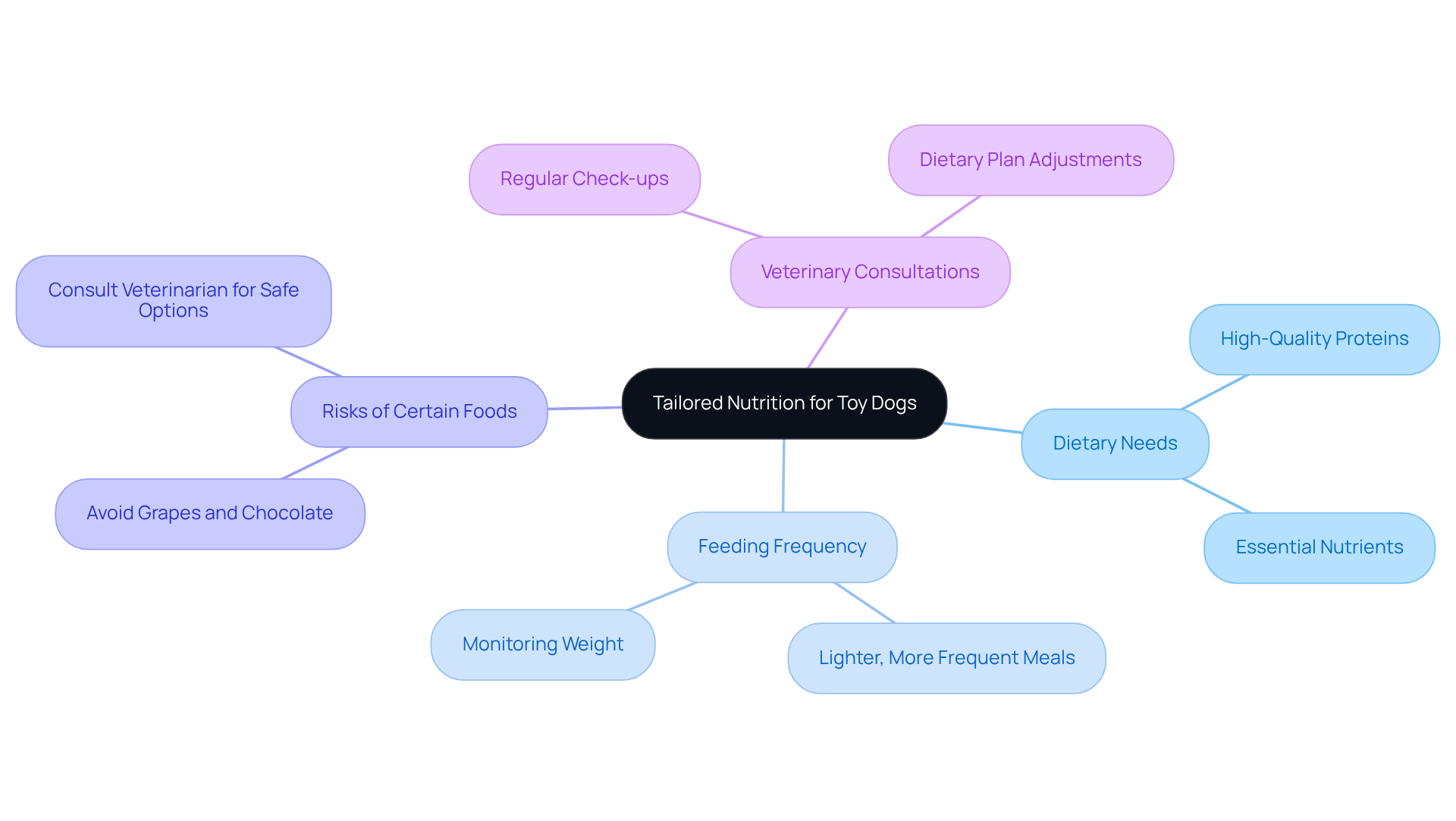
Facilitate Regular Exercise and Socialization Opportunities
While toy dogs may not require as much exercise as their larger counterparts, it’s important to recognize that these toy dogs still need regular physical activity to maintain a healthy weight and prevent boredom. At Jet Pet Resort, we understand the unique needs of small breeds and offer a dedicated Tiny Tots activity schedule. This features daily outdoor playtime specifically designed for them from 1:00 to 1:20 PM, ensuring your pet enjoys safe and engaging play in a secure environment. Daily walks, interactive play sessions, and mental stimulation through puzzle toys are wonderful ways to keep them engaged and happy.
Equally crucial is socialization; exposing toy dogs to diverse environments, people, and other animals fosters good manners and reduces fearfulness. Imagine how a puppy that hasn’t had exposure to humans before 14 weeks might struggle to form normal bonds later in life. This highlights the importance of early socialization. Enrolling your pup in puppy classes or playgroups specifically designed for small breeds, like those at Jet Pet Resort, can facilitate safe interactions and enhance their social skills. Additionally, providing opportunities for off-leash play in secure areas can significantly boost their confidence and help them flourish.
As specialists emphasize, ‘Puppy socialization practices play a significant role in the development of well-adjusted adult canines that show few undesirable behaviors.’ Properly socialized puppies are less likely to display behavioral issues as adults, including aggression and fearfulness. By prioritizing these socialization techniques and utilizing the resources at Jet Pet Resort, you can ensure that your toy dog grows into a well-rounded companion, full of joy and confidence.
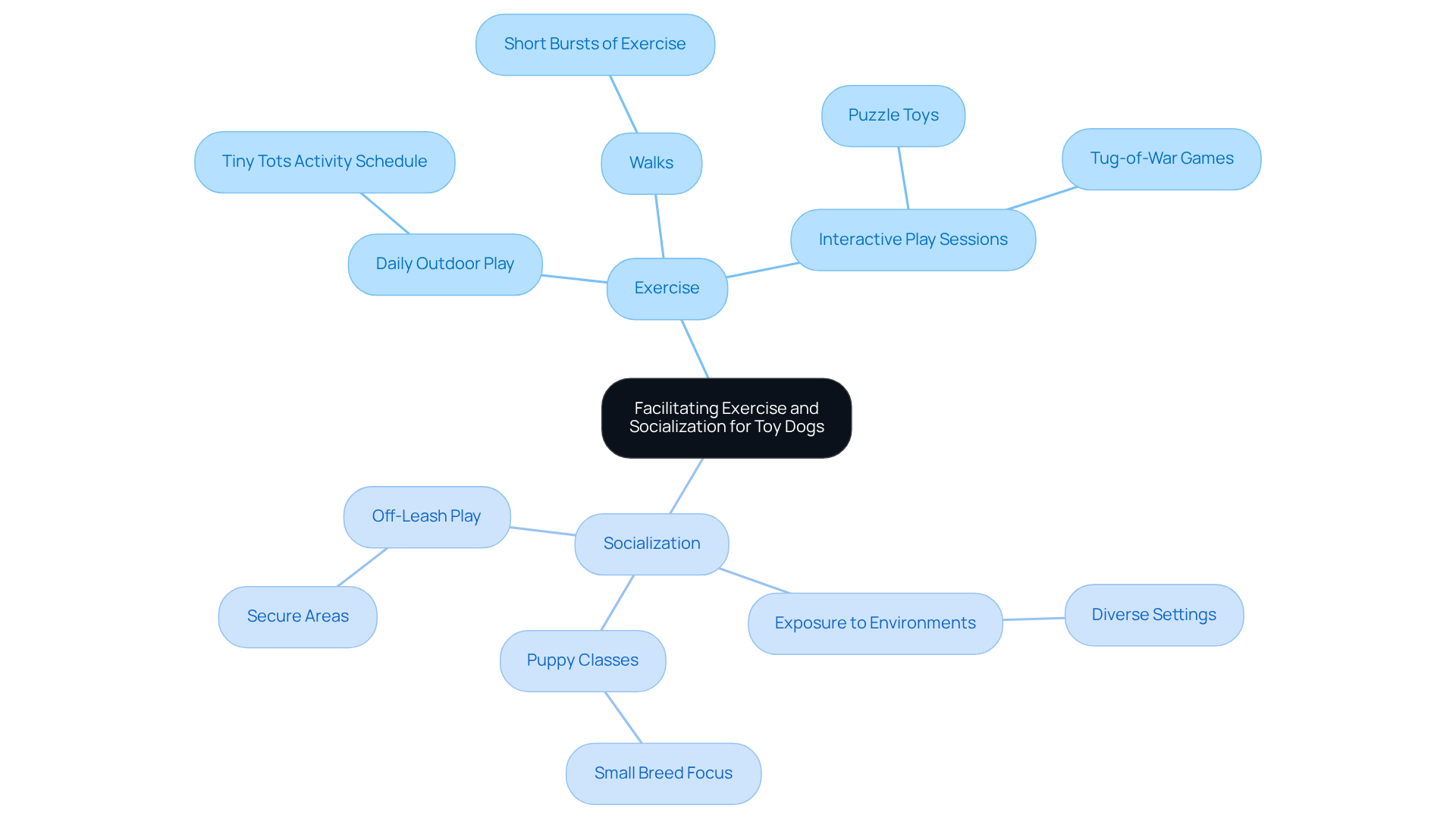
Implement a Consistent Grooming and Health Care Routine
Caring for your toy dog is not just about keeping them looking their best; it’s also about ensuring their happiness and health. Regular grooming is essential to maintain their coats and prevent those pesky tangles and mats. Depending on the breed, this might mean brushing several times a week and scheduling regular visits to a professional groomer. As a loving pet owner, you may worry about your furry friend’s well-being, and it’s crucial to address these concerns with proactive care.
Equally important is dental care. Just imagine the joy of seeing your toy dog beam with happiness! Owners should brush their toy dog’s teeth daily and provide dental chews to maintain their toy dog’s oral health. It’s alarming to note that around 80% of canines over the age of three encounter some degree of dental disease, which makes regular dental care absolutely vital. As Declan O’Keeffe wisely states, “Understanding the signs of dental disease in dogs is essential for early detection and effective prevention.” By taking these steps, you can help your beloved companion avoid discomfort and maintain a happy, healthy life.
Regular veterinary visits are also crucial for vaccinations, parasite prevention, and early detection of health issues. Keeping a health log can be a comforting practice, allowing you to track vaccinations, treatments, and any behavioral or health changes. This ensures that comprehensive care is provided for your toy dog throughout their life. By implementing these practices, including establishing a tooth brushing routine from a young age with dog-specific toothpaste and toothbrushes, you can significantly enhance your small dog’s overall well-being and happiness. Remember, your commitment to their care reflects the love and bond you share, and it’s a journey that brings joy to both of you.
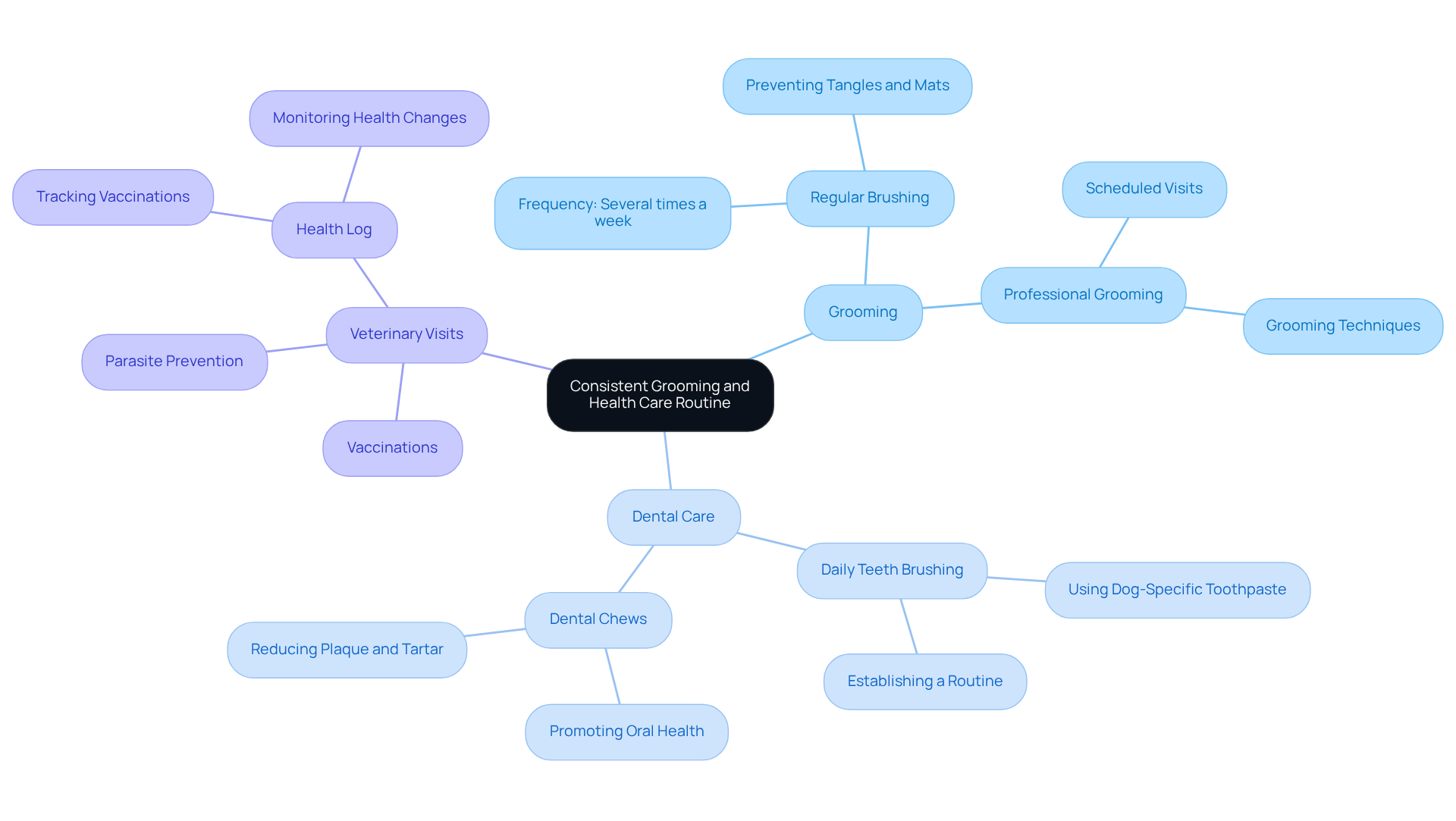
Conclusion
Caring for toy dogs requires a heartfelt understanding of their unique needs to ensure their health and happiness. These small breeds, cherished for their affectionate nature and lively personalities, flourish in environments that cater specifically to their delicate requirements. By acknowledging their sensitivity to temperature, dietary needs, and socialization, owners can cultivate a nurturing atmosphere that supports their well-being.
Key strategies for ensuring the health and happiness of toy dogs include:
- Providing customized nutrition
- Regular exercise
- Consistent grooming
High-quality, small-breed-specific diets are essential in preventing obesity and promoting vitality, while daily physical activity and socialization opportunities are crucial for mental stimulation and behavioral development. Moreover, a proactive grooming routine and regular veterinary check-ups are vital in addressing the common health issues faced by these breeds, ensuring they remain healthy and content.
Ultimately, the commitment to understanding and addressing the specific needs of toy dogs not only enriches their lives but also deepens the bond between pet and owner. By embracing these essential care tips—such as seeking appropriate nutrition, facilitating exercise, and establishing a grooming routine—toy dog owners can create an environment where their beloved companions thrive. This sense of responsibility paves the way for a joyful and fulfilling life for both the pet and its owner, illustrating the profound impact that dedicated care can have on these cherished little friends.
